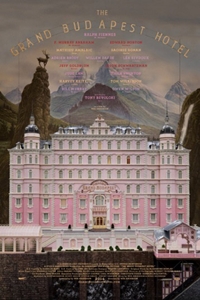The Grand Budapest Hotel
 Directed Wes Anderson
Directed Wes Anderson
Starring Ralph Fiennes, Tony Revolori, Saoirse Ronan, Jeff Goldblum, Willem Dafoe and Bill Murray
From 20th Century Fox
Rated R
99 minutes
Fiennes leads the charge in Anderson's Budapest assualt
by Michael Clawson of Terminal Volume
Few things are more blissful at a movie theater than a Wes Anderson film. Even amid death, his depression-laden heroes and some of his more morbid curiosities, you can’t help but smile at his films’ intoxicating presentation and their cheerful precociousness.
Anderson’s body of work, astoundingly unique and inventive beyond all reason, exists in a strange world somewhere between cinema and stage play. And not like a Broadway play either; more like a low-budget children’s theater, one overrun by adult actors, even prestige adult actors. He frames these actors with deep affection amid tableaus of artifice, living dioramas in make-believe tangents of the real world.
His new film, The Grand Budapest Hotel, seems to exist even further outside our plane of existence, in an implausibly quirky Eastern European country in the 1930s. Previous films were shot in schools (Rushmore), trains (The Darjeeling Limited) and oceans (A Life Aquatic), but Budapest exists in sprawling interiors, hilariously simple effects shots and in stylized graphical animations. I hope a hotel like this exists, but then again it works better as fantasy untouched by reality. The movie has an interesting framing device: a woman is reading a book by an author who was told a story by a guy who knew a rather famous hotel concierge. It's somewhat confusing, but made clear in the final shot.
In flashbacks, we're shown the Grand Budapest Hotel and its star concierge, Gustav H. (Ralph Fiennes), a man of impeccable taste in everything except ethics, which he abuses to no end by wooing and sleeping with the hotel's older guests. His scorecard of nonagenarian conquests is shown in a montage that is purely and energetically Andersonian in spirit and delivery.
Gustav is thrown under the microscope when one of his mistresses dies as unexpectedly as a 97-year-old woman can and after changing her will so that Gustav H. gets an expensive painting the rest of her miserable family had been hoping to inherit. With the help of a talented lobby boy named Zero (Tony Revolori), a baker's apprentice (Saoirse Ronan), a hotel owner (Jeff Goldblum) and a fleet of other smaller characters, Gustav H. fights the mistress' family, a vampiric assassin (Nosferatu himself, Willem Dafoe), local police and thinly veiled Nazi stand-ins known as the Zig Zag.
Of course, that's the plot, but that's only a small portion of any Wes Anderson movie. Much of the movie exists in its wacky presentation, its dryly written humor, its adorable sense of time and place, and its ever-expanding cast of characters — Bill Murray and Bob Balaban turn up, and I think George Clooney had a blink-and-you'll-miss-it cameo. And in an Anderson first, the director jumps genres mid-film. What starts as a fairly standard indie-comedy eventually plays with other motifs: a whodunit, a slasher thriller, a romance and a prison movie.
The prison material takes up a large chunk of film, but it's likely to be a highlight for many viewers, with Gustav H. serving as the prison concierge to a bunch of murderers and cutthroats — “How bout some mush, old chaps?” This is the kind of movie that has prison cakes filled with hacksaws and hammers and it totally gets away with it. The tools serve a prison breakout that lovingly winks at The Great Escape. Anderson is prone to homage, and he does it several times here. In one scene, Anderson re-enacts a scene from Alfred Hitchcock’s Torn Curtain almost verbatim, but with a terrifyingly sudden climax.
And when it's not re-imagining classics, it's becoming one: there’s an extended chase sequence that leads high up into the Alps on a cable car and then into a monastery, where Gustav H. tracks down his only alibi. The scene ends with the most understated and absurd chase scenes of recent memory as Zero and Gustav sled through every winter Olympic event possible. The special effects are bogus and cheeseball, but that’s precisely the point of this whimsical movie and its outlandish examination of Europe.
One other curiosity: the film switches aspect ratios depending on which time period the movie is in. Some of the picture is told, presumably, in the 1980s, as Jude Law plays a hotel guest listening to another guest (F. Murray Abraham) talk about Gustav H. In these scenes, the film fills the whole canvas of the screen, but then in the 1930s the edges are cropped, as if watching an old movie, its squarish aspect ratio curtained by blackness on its side.
Everything about this movie is just lovely: the clothing, dialogue, every character, Fiennes, Fiennes, Fiennes, the pastel coloring, meticulously designed props, lavish sets, obviously fake sets, sets that seem to be made of paper … each scene is rich with tiny detail. Notice how Gustav H. steps in the elevator and flips a switch to turn the elevator light on, or Zero’s penciled-in mustache, or how Saoirse Ronan has a birthmark in the exact shape of Mexico on her cheek, or that obscene painting Gustav hangs on his mistress’ wall. The movie careens forward with presence and determination.
That being said, let me offer this: this is not Wes Anderson’s best work, a spot I still reserve for The Royal Tenenbaums. I wanted Grand Budapest Hotel to be funnier and more mischievous, but also more grounded. It’s still very good, but as an admirer of Anderson’s previous films, I wanted this one to ring with more truth. At times it gets so big and so comically wacky that it feels empty in places. Let me be clear, though, about my brief complaints: some unevenness aside, this is still lovely filmmaking of the highest order and yet another shining achievement from Wes Anderson.









